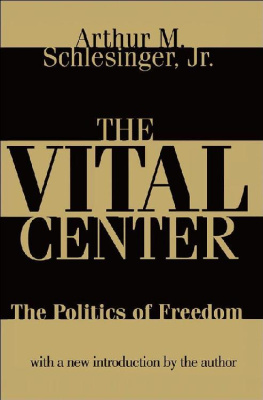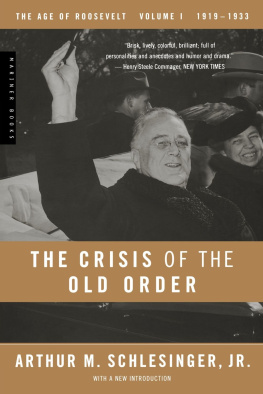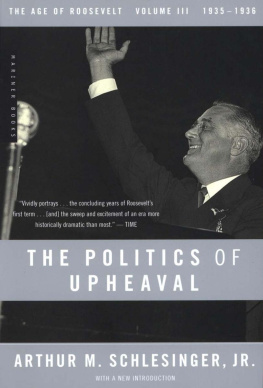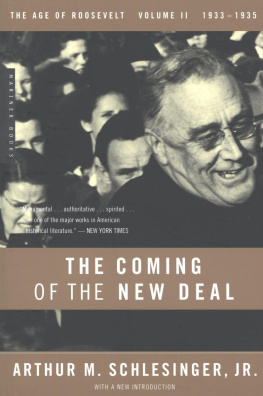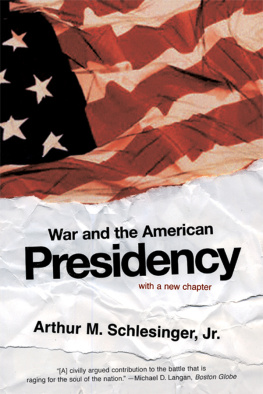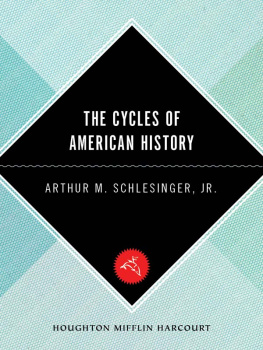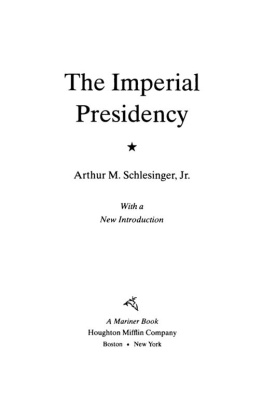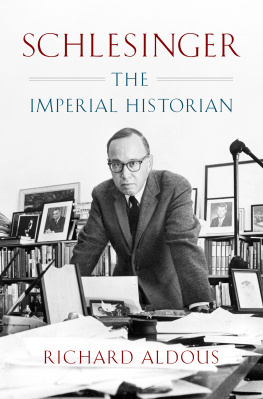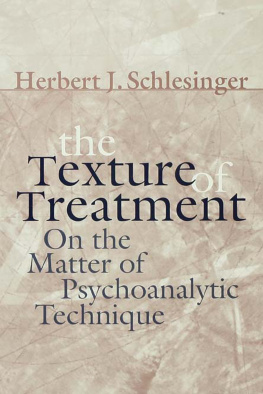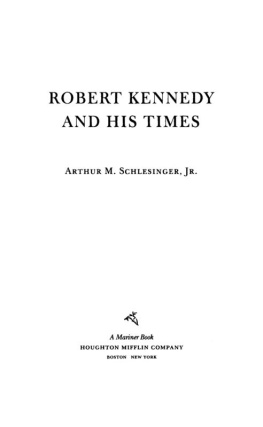Arthur M. Schlesinger Jr. - The vital center: the politics of freedom
Here you can read online Arthur M. Schlesinger Jr. - The vital center: the politics of freedom full text of the book (entire story) in english for free. Download pdf and epub, get meaning, cover and reviews about this ebook. year: 2017, publisher: Routledge, genre: Politics. Description of the work, (preface) as well as reviews are available. Best literature library LitArk.com created for fans of good reading and offers a wide selection of genres:
Romance novel
Science fiction
Adventure
Detective
Science
History
Home and family
Prose
Art
Politics
Computer
Non-fiction
Religion
Business
Children
Humor
Choose a favorite category and find really read worthwhile books. Enjoy immersion in the world of imagination, feel the emotions of the characters or learn something new for yourself, make an fascinating discovery.
- Book:The vital center: the politics of freedom
- Author:
- Publisher:Routledge
- Genre:
- Year:2017
- Rating:5 / 5
- Favourites:Add to favourites
- Your mark:
- 100
- 1
- 2
- 3
- 4
- 5
The vital center: the politics of freedom: summary, description and annotation
We offer to read an annotation, description, summary or preface (depends on what the author of the book "The vital center: the politics of freedom" wrote himself). If you haven't found the necessary information about the book — write in the comments, we will try to find it.
Arthur M. Schlesinger Jr.: author's other books
Who wrote The vital center: the politics of freedom? Find out the surname, the name of the author of the book and a list of all author's works by series.
The vital center: the politics of freedom — read online for free the complete book (whole text) full work
Below is the text of the book, divided by pages. System saving the place of the last page read, allows you to conveniently read the book "The vital center: the politics of freedom" online for free, without having to search again every time where you left off. Put a bookmark, and you can go to the page where you finished reading at any time.
Font size:
Interval:
Bookmark:

The Vital Center
Arthur M.
Schlesinger, Jr.
The Politics of Freedom
with a new introduction by the author

Originally published in 1949 by The Riverside Press.
Published 1998 by Transaction Publishers
Published 2017 by Routledge
2 Park Square, Milton Park, Abingdon, Oxon OX14 4RN
711 Third Avenue, New York, NY 10017, USA
Routledge is an imprint of the Taylor & Francis Group, an informa business
New material this edition copyright 1998 by Taylor & Francis.
All rights reserved. No part of this book may be reprinted or reproduced or utilised in any form or by any electronic, mechanical, or other means, now known or hereafter invented, including photocopying and recording, or in any information storage or retrieval system, without permission in writing from the publishers.
Notice:
Product or corporate names may be trademarks or registered trademarks, and are used only for identification and explanation without intent to infringe.
Library of Congress Catalog Number: 97-23127
Library of Congress Cataloging-in-Publication Data
Schlesinger, Arthur Meier, Jr. 1917-The vital center : the politics of freedom / Arthur M. Schlesinger, Jr.; with a new introduction by the author.
p. cm.
Originally published: Boston: Houghton Miffin, 1949. Includes bibliographical references and index. ISBN 1-56000989-6 (pbk.: alk. paper)
1. Totalitarianism. 2. Communism. 3. Liberalism. 4. United StatesPolitics and government1901-1953. 1. Title.
JC481.S38 1997
320.5 l-dc21
97-23127
CIP
ISBN 13: 978-1-56000-989-4 (pbk)
for
Stephen Katharine Christina Andrew
Turning and turning in the widening gyre
The falcon cannot hear the falconer;
Things fall apart; the centre cannot hold;
Mere anarchy is loosed upon the world,
The blood-dimmed tide is loosed, and everywhere
The ceremony of innocence is drowned;
The best lack all conviction, while the worst
Are full of passionate intensity...
And what rough beast, its hour come round at last,
Slouches toward Bethlehem to be born?
W. B. YEATS
the Transaction Edition
THE VITAL CENTER, first published in 1949, has enjoyed, after nearly half a century, an unexpected revival. We proclaim, President Clinton said on the night of his re-election in 1996, that the vital American center is alive and well. In a press conference two days later: Our people voted for the ideas of the vital American center. The revival, moreover, had a bipartisan tinge. Earlier in the year, Newt Gingrich, Speaker of the House of Representatives, had surprised R. W. Apple, Jr., of the New York Times (not to mention startling The Vital Centers author) by quoting with approval a sentence from the book.
The sentence the Speaker liked (on page 174) was, also surprisingly, a plea for humility on the part of both conservatives and radicals. As for Mr. Clinton, he evidently added the word American to give his vital center a domestic context. This is a time of such profound change, he had said in April 1995, that we need a dynamic center that is not in the middle of what is left and right but way beyond it. The transition into the computer age, he has suggested, confronts the United States with problems that render familiar divisions between right and left obsolete problems that Americans must attack together without reference to shibboleths of the past.
My vital center was in a global contextliberal democracy as against its mortal enemies, fascism to the right, communism to the left. We forget how beleaguered the democratic cause had been in the 1930s. The Great War was thought to show that democracy could not produce peace; the Great Depression that democracy could not produce prosperity. Democracy seemed feckless, confused, paralyzed, doomed. Contempt for democracy was widespread among elites and masses alike: contempt for parliamentary methods, for talking-shops, for liberties of expression and opposition, for bourgeois individualism, for pragmatic muddling through.
Today, as former communist countries embrace the free market, it is hard to recall how potent the totalitarian appeal was sixty years ago to demoralized men and women drifting helplessly amidst the economic wreckage of free society. The psychoanalyst Erich Fromm wrote in 1941 about the escape from freedom. In the wake of war and depression, people turned to leaders like Lenin, Mussolini and Hitler and listened eagerly to their gospels. The totalitarian promise was one of action, solidarity, security, efficiency, order. Fascism and communism had acute doctrinal differences, but their structural similaritiesa single leader, a single party, a single infallible ideology, a single mass of disciplined followers, a merciless secret police meant that each had more in common with the other than with liberal democracy.
This Hitler and Stalin tacitly acknowledged when they signed their pact in August 1939. The Second World War began a few days later. There was considerable defeatism in the west. In 1940 Anne Morrow Lindbergh captured this mood in her best-selling book The Wave of the Future. While her husband, the famous aviator, predicted Nazi victory and opposed American aid to Britain, the gentle Mrs. Lindbergh anointed totalitarianism as democracys inevitable successor, a new, and perhaps even ultimately good, conception of humanity trying to come to birth. The evils of Hitlerism and Stalinism were merely scum on the wave of the future.... The wave of the future is coming and there is no fighting it. By 1941 there were only about a dozen democracies left on the planet.
Even after the defeat of fascism the future of democracy seemed problematic. The war had shattered the international order. With the Axis states vanquished, the European allies exhausted, the colonial empires in tumult and dissolution, great gaping holes appeared in the fabric of world power. Only two nationsthe United States and the Soviet Unionhad the political, military and ideological dynamism to flow into the power vacuums. And the two nations were constructed on opposite and antagonistic ideas. Neither knew with any precision what the other was up to. A struggle for the future was inevitable.
In the meantime, the appeal of communism had been rekindled by the enormous Soviet contribution to the victory over fascism. Gratitude for the Red Army obliterated the Moscow trials and the Nazi-Soviet pact. Communism was winning adherents in the Third World, and even many in the western democracies sympathized with the Utopian dreams. Some opponents of communism, from Whittaker Chambers to Jean-Franois Revel, predicted that democracy was bound to lose the global struggle.
I had more confidence in the future of liberal democracy. In a way, The Vital Center was the testament of an American generationthose who were born during the First World War, who grew up during the Great Depression, who were formed by the spirit of the New Deal and by service in the Second World War. While faith in democracy ebbed away in Europe in the 1930s, it revived in the United States. For my generation in America, liberal democracy was not effete and impotent but rather had a positive and confident ring. It stood, not for ideology and illusion, but for empiricism and achievement.
Font size:
Interval:
Bookmark:
Similar books «The vital center: the politics of freedom»
Look at similar books to The vital center: the politics of freedom. We have selected literature similar in name and meaning in the hope of providing readers with more options to find new, interesting, not yet read works.
Discussion, reviews of the book The vital center: the politics of freedom and just readers' own opinions. Leave your comments, write what you think about the work, its meaning or the main characters. Specify what exactly you liked and what you didn't like, and why you think so.

